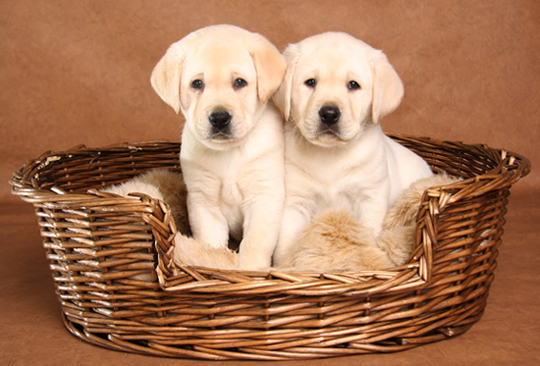Puppy Buyer's Guide
Introduction
A puppy buyer should understand they are purchasing a companion for ideally the next 15 years. A careful selection will dramatically increase the chances that this will be a healthy, delightful companion.
The primary determining factor of a litter's quality (meaning health, temperament and looks) will be the puppy's parents. A responsible breeder puts a great deal of thought into each litter, matching parents based on health issues, temperament, looks, and performance records. However, don't expect to be able to see both parents in the breeder's own kennel. Often breeders will use an outside stud dog. Typically only the most established breeders will own a stud dog of such quality as to be the very best match for their bitch. Close proximity is usually not a valid reason for a breeding.
The second critical factor in a puppy's future is how it is raised. Much research has been done on critical periods of puppy development, and the consensus is overwhelming--puppies need lots of human contact. While there is no magic age for separating a pup from its littermates and dam, there is conclusive evidence that no puppy should leave the breeder before seven weeks.
|
|

|
While breeders utilize a wide variety of facilities for puppy raising, from elaborate kennel buildings to garages to living rooms, cleanliness and human contact is what's important, not the fanciest setup. As pack animals, puppies learn from their mother that their "den" should remain clean, and eventually they begin to go further and further from their sleeping area to soil making them easy to housetrain. A litter that is kept in a dirty pen learns to disregard where they potty, making them very difficult to housetrain.
Most contracts include basic health warrantees and requirements for basic care on the owner's part. Breeders carry an enormous burden to produce dogs that conform to the breed's standard for looks, temperament, and working ability while being free of genetic disease. Making color, sex and other superficial characteristics your priorities increases your risk of not getting a healthy companion for a lifetime. Responsible breeders love contact from puppy buyers only interested in a quality dog, but will be patient with your desire for a particular color or sex if you are willing to wait for the right one to be available.
Guidelines
Each breeding and the resulting puppies should meet the BCLRC Breeder’s Code of Ethics. The breeder should be able to explain why this particular match of stud dog and brood bitch took place.
Buyers should be completely honest and forthright as to their home situation, how this puppy will be raised and kept throughout its lifetime, and all of their expectations in acquiring this new family member.
Buyers should be able to meet at least one parent and see pictures of a parent who is not on the premises. All pedigrees and clearances should be available.
All areas where the puppies and other dogs are kept should be clean with obvious marked attention to their safety and well being. Temperature should be kept at comfortable levels. As the puppies out-grow their whelping box, their puppy pen should be the same: clean, comfortable and safe. Puppies should appear to be content and not under any stress, either as to health or environment.
The puppies should appear to be well socialized. Buyers should know that every breeder will have different rules regarding visits to their litters. Please understand and abide by them. They are established to keep the puppies and their mother healthy.
Puppies should be on an appropriate worming schedule.
|
|

|
Puppies should receive their first vaccination between 7 and 8 weeks and this vaccination should be given prior to the puppy leaving the breeder's premises. Puppies should not be available for going to their new homes prior to 7 weeks.
Puppies should be tattooed or microchipped prior to going to their new homes. All puppies must be registered with the Canadian Kennel Club. It is the breeder’s responsibility to do this.
Buyers should understand that breeders are aiming to produce puppies that will fulfill a particular goal such as conformation shows, field events, agility trials, service etc. Puppies in a particular litter that appear to have those qualities will be earmarked for homes that will take that puppy to its full potential. In no way are the other puppies in a litter inferior.
A well-thought out breeding with proper raising will produce wonderful, sound and attractive pets. Buyers should understand that a breeder who takes the effort to produce a litter as described above and gets to know the prospective buyers and their home situations, will be able to best match each puppy to a particular home and family with greater chances of success than if the buyer makes his/her own choice. Many breeders, in fact, insist on making that final decision.
Buyers should familiarize themselves completely with the paperwork and information that a breeder provides. Breeders welcome the opportunity to answer any questions and concerns. Buyers should be given instructions regarding care and feeding of the puppy. This should take place in plenty of time for them to prepare for the day they take their puppy home.
Contracts and guarantees can be an important consideration when purchasing a puppy. However, remember that a contract is only as good as the person offering it. There are no ironclad guarantees when breeding animals. A breeder can do everything considered normal and appropriate to breed healthy animals, and still produce the occasional genetic health issue. Potential buyers should receive a copy of the contract/guarantee prior to any deposit being made, in order for them to completely understand both their and the breeder obligations.
|
|

|
Buyers should be treated with complete honesty and openness. They have a right to expect respect and consideration. All agreements between Buyer and Breeder should be spelled out in writing. Deposits and payments on any particular puppy should be written out, with any reservations clearly documented. Buyers should expect eager and friendly follow up care after their puppy is taken home. In fact, breeders should be available for consultation and take an interest in the welfare of the dog for its entire life.
|

